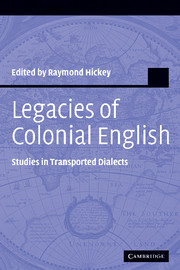Book contents
- Frontmatter
- Contents
- List of figures, maps and tables
- Contributors
- Foreword
- Introduction
- Part I Out of Britain
- Part II The New World
- 4 The emergence of American English: evidence from seventeenth-century records in New England
- 5 The language of transported Londoners: third-person-singular present-tense markers in depositions from Virginia and the Bermudas, 1607–1624
- 6 Remnant dialects in the coastal United States
- 7 Back to the present: verbal -s in the (African American) English diaspora
- 8 ‘Canadian Dainty’: the rise and decline of Briticisms in Canada
- 9 The legacy of British and Irish English in Newfoundland
- 10 The English dialect heritage of the southern United States
- 11 Solving Kurath's puzzle: establishing the antecedents of the American Midland dialect region
- 12 English dialect input to the Caribbean
- Part III The southern hemisphere
- Part IV English in Asia
- Appendix 1 Checklist of nonstandard features
- Appendix 2 Timeline for varieties of English
- Appendix 3 Maps of anglophone locations
- Glossary of terms
- General references
- Index of names
- Index of languages and varieties
- General index
8 - ‘Canadian Dainty’: the rise and decline of Briticisms in Canada
Published online by Cambridge University Press: 22 September 2009
- Frontmatter
- Contents
- List of figures, maps and tables
- Contributors
- Foreword
- Introduction
- Part I Out of Britain
- Part II The New World
- 4 The emergence of American English: evidence from seventeenth-century records in New England
- 5 The language of transported Londoners: third-person-singular present-tense markers in depositions from Virginia and the Bermudas, 1607–1624
- 6 Remnant dialects in the coastal United States
- 7 Back to the present: verbal -s in the (African American) English diaspora
- 8 ‘Canadian Dainty’: the rise and decline of Briticisms in Canada
- 9 The legacy of British and Irish English in Newfoundland
- 10 The English dialect heritage of the southern United States
- 11 Solving Kurath's puzzle: establishing the antecedents of the American Midland dialect region
- 12 English dialect input to the Caribbean
- Part III The southern hemisphere
- Part IV English in Asia
- Appendix 1 Checklist of nonstandard features
- Appendix 2 Timeline for varieties of English
- Appendix 3 Maps of anglophone locations
- Glossary of terms
- General references
- Index of names
- Index of languages and varieties
- General index
Summary
Canadian English is one of the oldest transported varieties of English. Newfoundland, Canada's tenth province, is perhaps the oldest English-speaking colony in the New World, having been claimed by England in 1497, but Newfoundland English must be treated separately from other varieties of Canadian English because Newfoundland had a different settlement pattern and a long autonomous colonial history before becoming a province of Canada in 1949. (See Clarke, this volume.) In this chapter, I deal with mainland Canadian English, that is, with varieties spoken everywhere but Newfoundland.
Mainland Canadian English is also venerable. English-speaking settlers began arriving in the part of the world that would become mainland Canada in 1713 when the French were forced to cede their colonies on the Atlantic seaboard to Britain, under the terms of the Treaty of Utrecht which ended Queen Anne's War. Those colonies, called Acadie by the French, became charter members of the Canadian Confederation 156 years later as the provinces of Nova Scotia, New Brunswick and Prince Edward Island. In 1763, fifty years after English-speaking settlers began arriving in Acadia, the French lost another war to England and were forced to cede their inland colony on the St Lawrence River, called Nouvelle France, in the Treaty of Paris. At that point, all of mainland Canada came open to English-speaking colonists.
England was a much more avid empire-builder than France had been (Chambers and Heisler 1999) and settlers began arriving in fair numbers soon after.
- Type
- Chapter
- Information
- Legacies of Colonial EnglishStudies in Transported Dialects, pp. 224 - 241Publisher: Cambridge University PressPrint publication year: 2005
- 2
- Cited by



